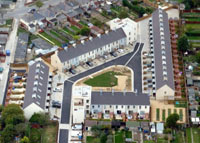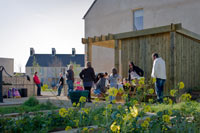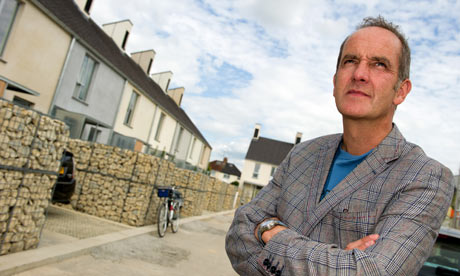A former editor of mine was fond of saying, as he watched his eminent colleagues accept toxic invitations to advise on projects such as the Millennium Dome, that "journalists can't do things". We might spend our lives telling others how to save the euro, or select an England team, or design a skyscraper, but when it comes to organising people to achieve a shared aim, we tend to lack patience or the ability to work towards a deadline months rather than days away. Writers tend to be individualists, looking for new discoveries, not methodical team players.
The same could be true, with knobs on, for TV presenters. So it is striking that Kevin McCloud, presenter of Grand Designs, should now be trying his hand as an enlightened property developer. For years, he has cast his eye over the hopes, follies and struggles of people trying to build beautiful homes for themselves. Now he is daring to show how it should, or could, be done. "I would get on a train to go from one location to another," he says, "and pass another 5,000 houses in Ilfracombe or Norwich or Aberdeen and they would all look the same. I thought, 'Is this the best we can do?' "
Five years ago, he set up a company called Hab (Happiness Architecture Beauty) in order to "build houses that make people happy". The recession has slowed its progress, but its first creation, a 42-home development in Swindon called the Triangle, is now complete. Next month, Channel 4 is screening Kevin's Grand Design, a two-part documentary about the project, which was achieved in partnership with the housing association, GreenSquare Group. When it is suggested that the attention these programmes will attract will be a double-edged sword, he says: "It will be a one-edged sword with the blade laid across my throat."
He is addressing the great British housing problem. For decades, it has been plain that new houses are unimaginative, overpriced, undersized and resistant to the kind of technical improvement that is standard in industries such as car making. Changes in planning law, to improve design or make housing more accessible, are forever tried and forever failing. The rather daunting task he has set himself is to deflect the glacial flow of change, to make "a very significant difference from conventional development".
With his trademark energetic enthusiasm, he reels off technical details about attenuation tanks and swales. He wants to create a truly sustainable development. So the Triangle's open spaces are designed to soak up rainwater, so that the risk of flooding is lowered, the pressure on Swindon's drainage is reduced and the planting remains lush in hot weather. It has what Hab's design director, Isabel Allen, calls a "muddy, soggy landscape" which has the added benefit that it is fun for children to play in it.
 The development is built around a ‘village green’, where children are encouraged to play. The Triangle’s open spaces are designed to soak up rainwater and so reduce the risk of flooding. Photograph: Hab Oakus
The development is built around a ‘village green’, where children are encouraged to play. The Triangle’s open spaces are designed to soak up rainwater and so reduce the risk of flooding. Photograph: Hab OakusThe external walls of the houses are made out of hempcrete, a material that is not only highly insulating but, being made out of a plant – hemp – takes more carbon out of the atmosphere than it puts in. The houses also have chimney-like objects on their roofs, which are actually ventilators, that help the houses to cool naturally.
"Anyone can build an eco-home," he says, "but it doesn't solve anything. There is nothing to stop them turning up the thermostat. What's more interesting is the way people live and behave." So the Triangle has allotments and polytunnels where people can grow their own food, and a car club and a scooter club that make their use of transport less wasteful. He sees such things as more important than the design features of individual houses.
Most of all, McCloud wants to create a community. The houses of the Triangle are arranged in traditional terraces, enclosing a kind of village green. Here, children can play on slopes and interestingly arranged logs and splash in water. Conventional swings and slides are avoided, however, on the grounds that these would mark the place as only for children and alienate the adults and teenagers who, it is hoped, will also enjoy the green.
Part of the point of the allotments and polytunnels is to bring people together and such things as barbecues and Halloween parties are encouraged. Irrigation is achieved with old-fashioned water pumps – more fun than standpipes – around which residents might gather. Each house is fitted with a "shimmy" – a touch-screen computer that McCloud calls a cross between "an iPad and a parish magazine". This enables residents to exchange information, help and advice and tells them about upcoming events.
Of the 42 homes, 21 are what is called "social rented", which is for people on the local authority's list of people in need of new homes. Eleven are "intermediate rented", which is at 80% of the market rent. Ten are "rent to buy", which means people rent them at below-market rates, with a view to saving for a deposit and ultimately buying their homes. There is therefore a mixture of people: teachers, retirees, single mothers formerly in council hostels, families who were in accommodation for the homeless.
The Triangle is so designed that no distinction is made between the house types. This, says McCloud, is "unlike schemes, including one that won the Stirling prize" – he means the Accordia development in Cambridge – "where the houses for sale are lovely and the social stuff is behind a wall".
It is striking, with all this ingenuity in the design, how very plain-looking the houses are. Any Grand Designs fan expecting another of the exotic creations featured in the programme will be disappointed. They are pitched-roofed, in straight rows, partly inspired by the railway workers' cottages that Brunel built in Swindon. Their elevations are in shades of cream and grey that echo the existing terraces and semi-detacheds of this part of town.
 The chimney-like features on the roofs are ventilators that help the houses to cool naturally. Photograph: Paul Raftery
The chimney-like features on the roofs are ventilators that help the houses to cool naturally. Photograph: Paul RafteryGlenn Howells, the architect of the Triangle, says that "the conversation we had was, 'Do we have the nerve to do something very, very normal?' With Kevin, everyone was expecting it to be more eye-catching, more televisual. People go there and say, 'Blimey, it looks normal.' That's the point." The idea of the terrace, he says, "started a long time ago and it will go on for another 500 or 600 years. It is such a good form". The only problem is that "there is a perception in the housing market that it won't sell, so developers have to make things convoluted, even though those to-die-for streets of Islington, where Boris Johnson lives, are all repetitive".
The aim, says Howells, is to "prove you can do excellent ordinary housing that sells and that people want to live in". It is about little things achieved within the standard budget for housing association developments – apart from a little additional support for some of the more adventurous environmental features. Bedroom doors are placed away from corners, so it is possible to place wardrobes behind them, and windows are larger than in most new housing. Ceilings are higher than standard on the ground floor (which means, to stay within budget, they are lower upstairs). The porches include space for bike racks, so that they don't have to be lugged through houses from the back garden, which makes it more likely they will be used.
On the outside, architectural expression is sought in such things as oversize rainwater pipes, which, together with change of hue from one house to the next, and vertically proportioned windows, help to define individual houses. In front of each house are gabion walls, gabion being the form of construction used in road embankments, where loose stones are placed in wire cages. Here, they screen parking spaces, so that cars do not dominate the appearance of the space.
McCloud says that "the design of spoons and the design of cities is one process" and it is the totality of the Triangle's inventions that matters. He is particularly keen on the importance of landscape design. Usually, says the Triangle's landscape architect, Luke Engleback, his role is to "decorate masterplans by others". Here, Engleback was involved from the outset in shaping the concept and form of the development.
McCloud keeps saying that "it's about the residents – it's their happiness that will determine the success of scheme". It will take years to find out if it really works but, meanwhile, I am introduced to 64-year-old Maggie Lowton, who was forced out of her home of 38 years by negative equity. "Since I started my affair with Kevin," she says, she has bought into his dream. "We love the house and feel privileged and proud. It's lighter, airier and easier to clean. It feels too nice and too new." The architectural aesthetics are of secondary importance. "People say, 'What are those stones for?'" she says of the gabions.
She says you can see a community forming, even if there are some points of friction – "you do hear snippets, like someone parking in someone else's space". As a Christian, she is wrestling with the problem of other people's faiths, including paganism. "Perhaps we can have a multi-faith Christmas tree," she says, "but I don't know how to do that… maybe we can have a pagan log." She wants "it to work for everyone. I want Kevin's dream to come true. What a waste if it didn't".
 Allotments, polytunnels and entertaining areas are designed to encourage communal activities. Photograph: Paul Raftery
Allotments, polytunnels and entertaining areas are designed to encourage communal activities. Photograph: Paul RafteryFor McCloud, the dream seems to originate in a love of the organic. "I grew up in the countryside – Bedfordshire. I was interested in birds and bees and flowers and mushrooms." He says there is "a spiritual dimension" to living with nature that he wants to give to the residents of Hab's developments. The village where he lived was also the kind of place where "kids played in the street on their bikes, and if a car came round the corner, it had to slow down".
Realising this dream requires a great deal of technical grind, of dealing with planners, highways authorities, water suppliers. It requires responding patiently to officials such as the one who, Engleback says, objected to fruit trees on the grounds that "someone might slip on a berry". McCloud's celebrity means that "doors are opened a little more quickly", but also that "it is very important for local authorities not to be seen to be granting us the smallest favour. We can't cheat or push or cut corners".
The Triangle has required an exceptional amount of effort by Hab, GreenSquare, their architects, engineers and other consultants, all to achieve a simple array of row houses which – albeit without such high environmental performance – would once knocked have been knocked up almost without thinking by builders. Larger developments are now on the way in Oxford and Stroud, but McCloud is not expecting these to be much easier. The hope is that others will follow the example.
He acknowledges that the Triangle is not as advanced as some of the continental schemes in Tubingen, Stockholm and elsewhere which were his inspirations. They "emerged from a culture of planning and construction that is far more evolved, and far more sophisticated, than in Britain," he says. "But," he adds, "I feel we have hit on the grail. We have made a very significant difference from conventional development… we're 90% there, and to do it in Swindon in a difficult economic climate – I'm happy."
He thinks he is doing better than the Prince of Wales's Poundbury. "One positive thing about Poundbury was the way perceived ownership of the public realm meant the residents adopted it," he says. But "one of the failings is the way the external appearance is at the expense of internal architecture". In order to achieve the look of old cottages, "you get low ceilings and tiny windows".
The Triangle is in a tradition of model villages beloved of aristocrats, princes, of Brad Pitt in New Orleans and the Bordeaux sugar-cube manufacturer who commissioned workers' housing from Le Corbusier. Such places can be over-scripted, too much about fulfilling their makers' picture-book fantasies about contented communities. There is a whiff of this with Hab's gooey talk about "making people happy", although they are conscious of the need not to over-control. "If they decide they don't want to grow food and just want to park cars, we'd be a bit upset," says Isabel Allen, but in the end it will be up to the residents.
Maggie Lowton sounds a note of caution by citing other communities in Swindon that started well but went downhill. No amount of forethought and attention to detail can guarantee the success of the Triangle. But at the very least it is an imaginative and well-designed project, which achieves about as much as can be done with its budget. It focuses on what matters most and gives itself the best chance of success. Which is far more rare than it should be in British house building and a much better application of celebrity philanthropy than most.
- Guardian





